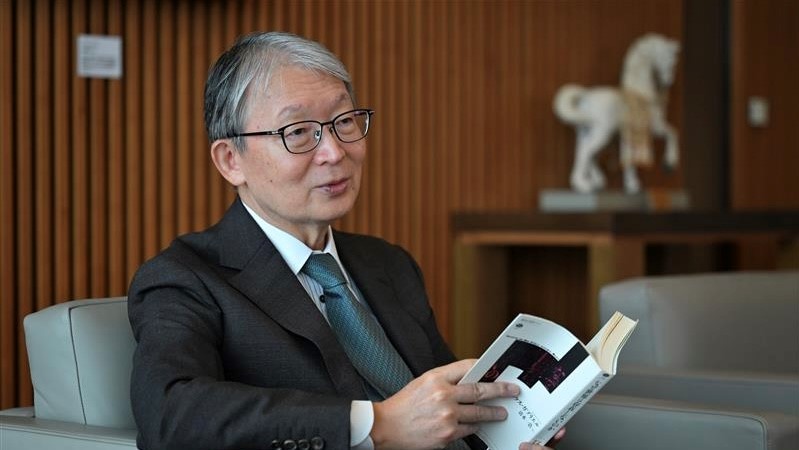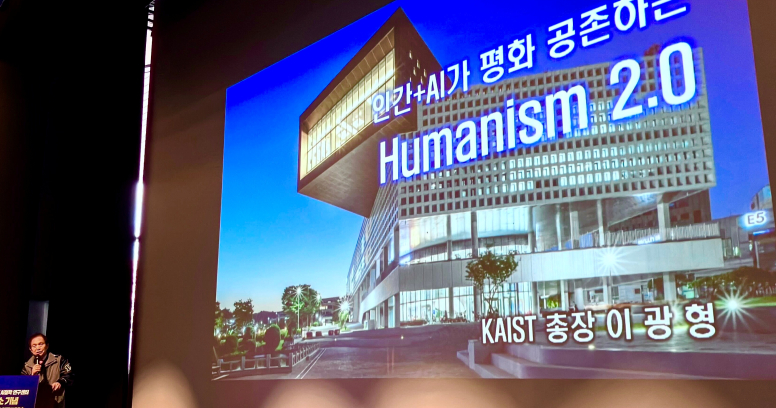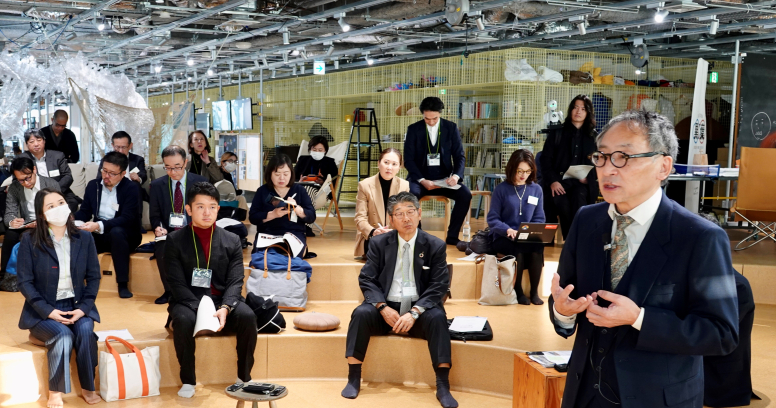【Relay Interview 5】 Toshikazu Yamaguchi, president of The Yomiuri Shimbun Holdings: Journalism is human activity: reclaiming humanism in the era of AI

We interviewed key members of the Kyoto Institute of Philosophy (KIP) for a series of articles about how they came to start their activities and their thoughts on future plans. For our final interview with a KIP director, we met with Toshikazu Yamaguchi, Representative Director President, The Yomiuri Shimbun Holdings.
Details
Interviewer: Please tell us about the circumstances that led to your participation in the Kyoto Institute of Philosophy.
Yamaguchi: In 2023, I felt a sense of urgency as ChatGPT rapidly spread worldwide. I wanted to outline the advantages and dangers of generative AI and propose a balanced approach that combines discipline with utilization. I therefore consulted NTT Executive Chairman Jun Sawada. Mr. Sawada had been aware of the issues long before I was and had been deeply contemplating the problems surrounding AI.
Thanks to Mr. Sawada, The Yomiuri Shimbun and NTT Corp. published a joint proposal on the future of generative AI in April 2024. During this process, I heard about the Kyoto Institute of Philosophy. Their philosophy that “new technology requires new philosophy” and their approach “based on Japanese philosophy and Eastern thought” strongly resonated with me, so I was honored to become a member of the institute.
Interviewer: One of the main themes of the 1st Kyoto Conference is “AI and the Question of the Human.” Your company values humanism as a news organization. How do you see the emergence of AI impacting humanism and, by extension, the nature of journalism?
Yamaguchi: The Yomiuri Shimbun upholds “The Creed of The Yomiuri Shimbun” as its pledge as a news organization. Freedom, humanism, and internationalism are the three pillars of the creed. The freedom envisioned by The Yomiuri Shimbun is the freedom as autonomy. The Creed of The Yomiuri Shimbun clearly states, “The Yomiuri Shimbun pursues freedom and accountability.” While it is called the freedom as autonomy, it strongly emphasizes the spirit of selflessness and altruism, so it does not fall into the category of “autonomy based on zero-sum game.” I feel it is closer to the freedom envisioned by Professor Yasuo Deguchi of Kyoto University.
As for humanism, we do not aim for a view of humanity applicable only in the Western World, but rather for a truly universal humanism — a humanism that transcends the clash of civilizations. Internationalism is a cooperative approach that avoids conflict by not ranking religions or ethnicities as superior or inferior, thereby striving to build world peace and economic stability.
The previous Creed of The Yomiuri Shimbun established in 1946 contained a phrase: “We will resolutely fight against dictatorial ideologies of both the left and right wings.” Both the previous and current Creed of The Yomiuri Shimbun reject totalitarian oppression and xenophobia and pursue a cooperative world that transcends zero-sum games. In this regard, our goals are, I repeat, quite close to Professor Deguchi’s thinking.
AI will undoubtedly impact humanism and journalism. Activities traditionally performed solely by humans are increasingly being taken over by AI. Transhumanism, which seeks to create humans that transcend biological limitations through science and technology, is becoming increasingly realistic, making it difficult to distinguish between humans and machines.
Concerned with human dignity, the EU has enacted AI legislation, strictly defining the requirements for high-risk AI — such as AI used in employee hiring and evaluation — and urging human oversight. Meanwhile, the United States saw a surge in state-level AI regulation efforts, with 693 bills debated across 45 states in 2024, resulting in 113 becoming law. In response, President Donald Trump issued an executive order barring AI regulation. This represents a situation where federal and state policies are moving in different directions. In a situation where perspectives on AI are fragmented, it is necessary to raise questions on how the relationship between humans and machines should be, and reexamine humanism.
The role of journalism is to serve as an extension of people’s eyes and ears, an extension of their minds. Therefore, journalists are required not to simply report what they themselves have seen and heard with their own eyes and ears, or what they have felt with their own minds, but to gather news on behalf of the readers, writing articles and conveying stories as though they were seen and heard through the readers’ eyes and ears, and felt through the readers’ minds.
Journalism conveys news, and news is the collective term for things people should know and things people are likely to be interested in. However, people cannot be interested in the unknown, so journalists must anticipate where readers’ interests would lie, gather and select information, and compile articles accordingly. Considering this nature of journalism, it can be said to be an intensely human activity, carried out by human journalists who carefully examine the public concerns and public interests of human readers.
In modern times, social media transmit information using criteria distinct from journalism. These criteria are associated with the attention economy, which operates not toward converging on people’s average interests, but toward stimulating specific interests and amplifying specific opinions. For this reason, modern journalism faces the challenge of delivering news to audiences who hold preconceived notions and specific opinions. This is where AI comes into play. AI accelerates the automated processing of social media, fueling the explosive spread of information. This could make the problem of misinformation increasingly severe.
Interviewer: Misinformation and disinformation have become increasingly difficult to identify as AI technology advances. They spread instantly across the world through social media, causing division. As a newspaper company, how will you address this issue?
Yamaguchi: There has been well-known research on misinformation at the Massachusetts Institute of Technology. A team of researchers investigated the diffusion patterns of about 126,000 news stories spreading on Twitter, tweeted by about 3 million people over 4.5 million times, covering a 12-year period from 2006. When the team examined which spread more widely — true news versus false news — they found that false news was retweeted 70% more often and spread at six times the speed of true news. In short, people are drawn to misinformation and conspiracy theories. Social media algorithms amplify this tendency. As a result, we actually see phenomena in which misinformation is widely believed to be true.
To tackle this challenge, a group of companies and other entities led by The Yomiuri Shimbun, Keio University and Dentsu Inc. is spearheading the development of a technology called “Originator Profile.” This technology identifies the source of information on the internet, and if the sender has certification from a third-party organization, that will also be displayed.
However, what newspapers should focus on more than these initiatives is, after all, accurate news. Sociologist Ikutaro Shimizu once contrasted journalism with rumors, saying, “When journalism functions properly, that is the normal state; when journalism is lacking and rumors run rampant, that is the abnormal state.” Newspapers must keep the fundamental principle of accurate reporting firmly in mind.
Interviewer: Do you often read philosophy books? Do you have a favorite philosopher?
Yamaguchi: I consider myself relatively well-read in philosophy. Primarily from the perspective of thinking about journalism, I have read Immanuel Kant, John Stuart Mill, John Dewey, Karl Popper, Tetsuro Watsuji, Eijiro Kawai, and others. I also enjoy Professor Markus Gabriel of the University of Bonn and read him frequently.
Interviewer: At the 1st Kyoto Conference, discussions will also take place regarding a “multilayered society of values.” What kind of discussions do you anticipate?
Yamaguchi: Since the modern era, the influence of the civilization of Western Europe has spread to many other countries, reaching its zenith in globalization, and I believe the current situation is that we face challenges and see no way out. The traditional approach of ranking values as superior or inferior and dominating other people cannot resolve problems and that could make conflict inevitable. Proposing a new concept of coexistence, which seeks values in a multilayered world, holds great significance.
Professor Emeritus Hidetaka Ishida of the University of Tokyo, an expert in media studies, proposes the concept of “polyphonic coexistence.” I hope we can engage in discussions that are polyphonic — not homophonic, and certainly not monophonic.
Others



